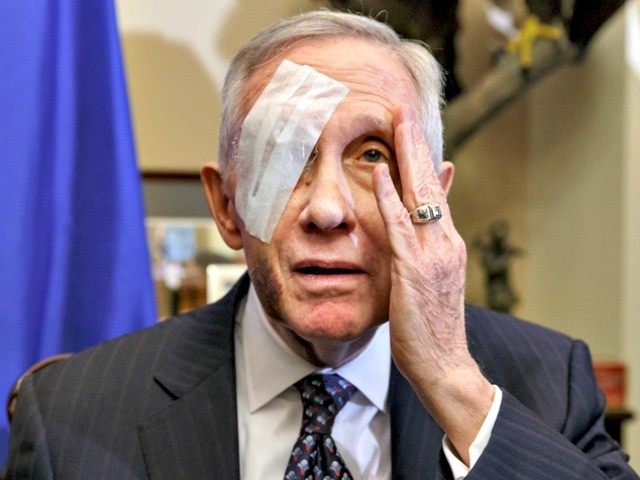DW-NOMINATE Scores
Party Vote
Harry Reid tends to vote with his party. His party unity vote score for the 113th Congress was 94.545 according to the Party Unity Scores from VoteView. This would be an interesting score for someone from Nevada considering it is sometimes considered a swing state. The Republican, Senator Heller from Nevada has a lower score for instance. However, Reid's higher score can probably be attributed at least partly to being the Majority Leader. With his position Reid has to lead the party and will mostly be voting with his party. The reason his score isn't even higher could be due to the fact that he will vote against the party at times only to bring the bill up again at a later time if it fails.
Congressional Quarterly, an entity that reports on the United States Congress, shows that since 2009 he has had a score in the mid 90s. This site also shows that Harry Reid's Presidential Support score has been higher than 90 since President Obama came into office. During Obama's first year, Reid actually had a score of 99. This was obviously due to being of the same party and trying to work together to get legislation passed with a Democratic majority.
Interest Group Scores
Interest group scores can be found at Project Vote Smart which is a site that tracks endorsements and ratings. Reid's scores can be attributed to his liberal stance as a Democrat. Most of his positions are rather favorable with these sorts of interest groups. According to this site these are some of Reid's recent scores:
- 90% rating with the ADA in 2013
- 100% with the ACLU in 2014
- 96% rating with the NAACP in 2014
- 80% lifetime score with the League of Conservation Voters in 2014
- 100% rating with NARAL Pro-Choice America along with many other Democrats in 2014
- 95% rating with the Service Employees International Union in 2012
Crossing Party Lines
Reid was not very bipartisan during the 113th Congress. As Majority Leader he sought to further his party's legislation leading him to be less bipartisan than he could have been. On GovTrack, a source that keeps good records on members of congress, he was rated the 1st lowest in writing bipartisan bills of all democratic senators. However, he was also in the highest 25% of democratic senators to join bipartisan bills. The contradiction here most likely comes about from Reid's leadership position where he sponsored a lot of bills that were for his party primarily which did not get bipartisan support. As a more experienced senator in his position he was also more likely to join certain bipartisan bills that were not controversial or very meaningful. Some of the legislation he cosponsored were S.2714 World War I American Veterans Centennial Commemorative Coin Act and S.Res. 471 (113th): A Resolution Honoring Former President George H.W. Bush on the Occasion of His 90th Birthday and Barbara Bush on the Occasion of Her 89th Birthday and Extending the Best Wishes of the Senate to former President Bush and Mrs. Bush. This was the sort of bipartisanship that can skew these scores.















